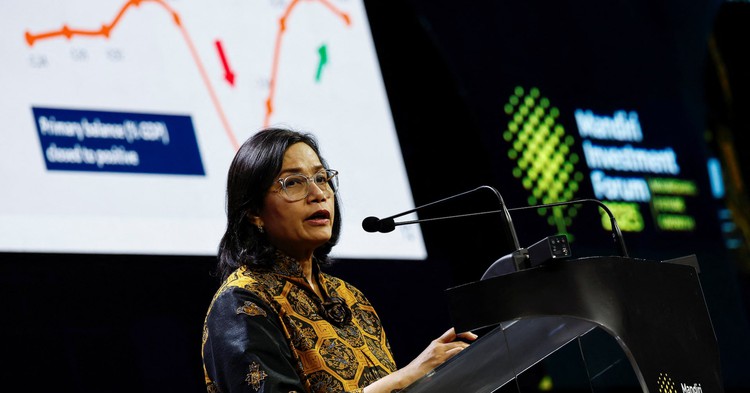
Indonesia's Finance Minister Sri Mulyani Indrawati delivers her speech during the Mandiri Investment Forum in Jakarta, Indonesia, February 11, 2025. Photo: Reuters
Global investors have viewed Sri Mulyani, one of Indonesia's longest-serving finance ministers in three different stints, as crucial to their bets in Southeast Asia's biggest economy and her previous departures sent markets tumbling.
The news of the finance minister's removal sent the rupiah tumbling over 1% on Tuesday, prompting Bank Indonesia to intervene in a bid to stabilize the currency. The rupiah was last at 16,488 per U.S. dollar, down over 1%. Jakarta stocks sank 1.6% in its biggest one-day drop since June.
"Mulyani was the safeguard of prudent fiscal policy," said Hasnain Malik, EM equity and geopolitics strategist at Tellimer. "Her departure will stir up fears of widening deficits under an unconstrained and, after the protests, under-pressure Prabowo."
The move to replace Sri Mulyani with Purbaya Yudhi Sadewa, an economist who has promised accelerated growth, comes at a delicate time for Indonesia as it grapples with widespread protests and unrest that have raged for two weeks.
Calls for a fairer taxation system have erupted as Prabowo faces the biggest challenge of his presidency so far while his flagship free meals programme that seeks to provide meals to over 80 million Indonesians has struggled in its first year.
"The key question for markets is whether Prabowo can have his cake and eat it too," said Trinh Nguyen, senior economist for emerging Asia at Natixis.
"To afford the lunch program, she (Mulyani) had to make the difficult decision of cutting expenditure very aggressively to maintain fiscal sustainability."
Sri Mulyani has won plaudits for reforming the taxation system and is widely considered the lynchpin behind improving Indonesia's fiscal performance and winning investor approval.
"The issue is how is the new FM going to afford the 1.5% of GDP lunch program and raise spending for sectors such as defence without punching a larger hole in the deficit. For investors, that will be a key concern," Nguyen said.
Purbaya told reporters the president's target of 8% economic growth was "not impossible" and that he would find ways to quickly boost the economy and push for more involvement of both the private sector and the government.
"Indonesia has long been very fiscally disciplined and heralded for it. Hence, a move to more aggressive deficits may be of concern to investors," said Jason De Vito, lead portfolio manager for emerging market debt at Federated Hermes.
Indonesia's international bonds fell and the focus is on whether Sri Mulyani's departure could force an exodus of global investors.
Foreigners hold less than 14% of outstanding Indonesian government securities, down from around a quarter back in December 2020, with the high-yielding bond market notoriously volatile during Indonesia's previous episodes of skyrocketing inflation.
Indonesia's foreign exchange reserves were at $150.7 billion at the end of August, down from the $152 billion a month earlier, data from the central bank showed on Monday, suggesting ample firepower for the central bank to defend the currency.
"Bank Indonesia will continue to be present in the market to maintain exchange rate stability and sufficient liquidity of the rupiah," said Erwin Gunawan Hutapea, the central bank's head of monetary management.
"IDR may have to bear the brunt ... until greater confidence about what the cabinet reshuffle entails for any prospective shifts in budgetary outlays and funding sources," said Aninda Mitra, head of Asia macro strategy at BNY Investment Institute.
"Market participants will want certainty about policy settings and a steady hand at the fiscal till."


Max: 1500 characters
There are no comments yet. Be the first to comment.